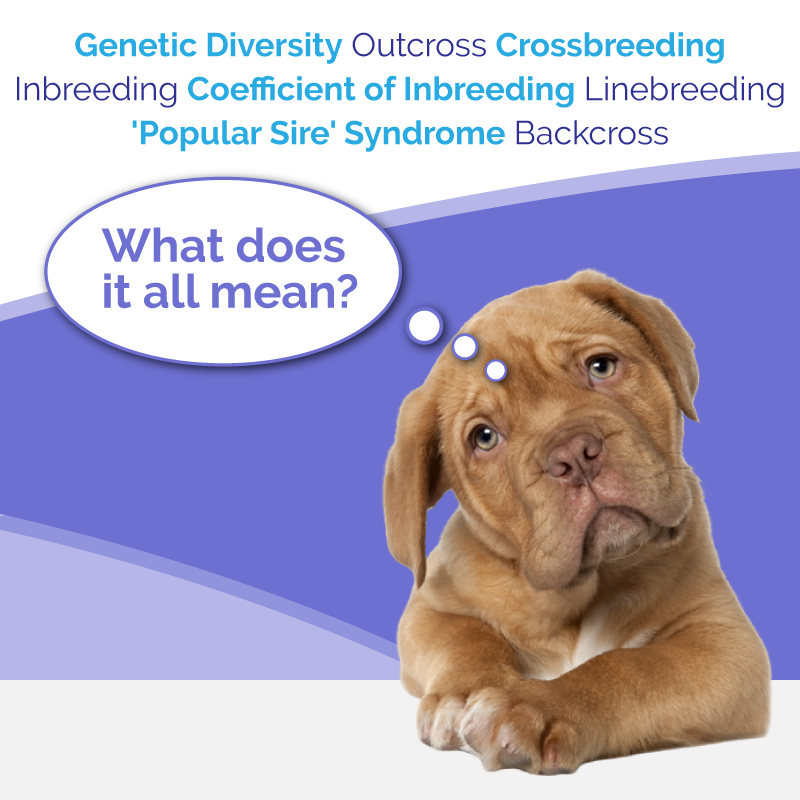⚠Stop and think before buying a flat-faced dog.
Breed Health Information
How to find a breeder who prioritises good health and welfare
|
Introduction
Many pure-bred dogs have a high incidence of genetic diseases as well as body shapes (conformation) which prevent them from having a comfortable life and a life in which they can enjoy all of the things dogs love to do. Dogs never complain and we can be misled into thinking everything is fine when it isn't. Please play your part in challenging poor practice and helping to raise the standards of dog health and welfare. On this page we provide breed specific health information for the 50 most popular dog breeds in the UK. We have also included some of the most popular cross breeds. Prospective puppy buyers can click on a breed listed below to find information about the essential documents a breeder should supply. We list the Health Schemes and DNA tests which apply to the breed and which a puppy buyer should ask the breeder about. We also list some diseases known to occur in the breed for which there is currently no health scheme or DNA test. It is important that both the male and female parent dogs have been health tested. It is perhaps unrealistic to expect a breeder to have carried out all of the tests listed. However, when a particular test has not been carried out, a good breeder should be able to explain why. A breeder must take into account the genetic diversity of the breed. Breeding from closely related dogs is harmful to a breed population and part of a breeder’s responsibility is to take this into consideration when selecting which pair of dogs to breed from. Temperament The temperament of both parents is crucially important as is the puppy habituation and socialisation the breeder carries out before the sale of the puppies. Dog Breeders Explained Guide to Different Types of Dog Breeder Brief Explanation of Different Types of Dog Breeder |
|
|
Please select a breed:
|
Note that the breed posters are under continuous scrutiny and revision as new health tests or scientific information becomes available.
|
|
More information on Buying a Puppy may be found here:
DBRG Guide to Buying a Puppy
www.dbrg.uk/guide-to-buying-a-puppy.html Canine Health Schemes www.bva.co.uk/canine-health-schemes Puppy Contract www.puppycontract.org.uk CFSG and DBRG Code of Practice for Dog Breeding www.dbrg.uk/code-of-practice-for-dog-breeding.html CFSG Guidance on Dog Conformation www.dbrg.uk/guidance-on-dog-conformation.html |
Inbreeding and Genetic Diversity
|
There is great concern amongst dog welfare scientists that the closed gene pools of pedigree dogs can increase the occurrence of inherited diseases and harmful physical traits.
This DBRG document attempts to explain the commonly used terms used in population genetics in our efforts to improve the health and welfare of all dogs. Inbreeding and Genetic Diversity Terms Explained |
|
Good Breeders follow ALL their puppies! And share the data.
From Brenda Bonnett in Brenda's Blog We are always struggling with defining good breeders, and it is a true challenge. But I have been talking about this topic lately, so thought I would blog on: 'Good Breeders follow ALL their puppies! And share the data'. This is one thing that there is really no good excuse for not doing, so kennel and breed club breeders - anyone who considers themselves a 'good breeder' should do their best in this regard. This was one topic I discussed in a recent talk to the Rhodesian Ridgeback Club of Canada at the National Specialty on 11 Sept. 2021. There are many challenges facing breeders - sometime integral to the status quo of show breeders, e.g.:
Some ideas are thought-provoking and challenging. But there are many tools available to help breeders in these tasks and many are listed in the talk. What does it mean follow ALL puppies:
Why do breeders hesitate to share accurate and complete data? This is a complex and dog-cultural question.
Whatever it is - a cultural shift - would be good for the health of dogs and breeds. This is written with full understanding that this is a big ask for breeders of many dogs... but it should be a responsibility of those creating the populations - and therefore contributing to the health and welfare of breeds. One other thought - please - make sure you have adequate evidence on the occurrence of a specific disease before requiring or recommending a new test! And remember - as important as it is to use genetic testing - these tests will not cover the range of IMPORTANT conditions in your breed. Genetic and other health testing is just a part of the behaviour of Good Breeders. See: Breed for the Big Picture! and Not all puppies from health-tested parents will be healthy! |


















